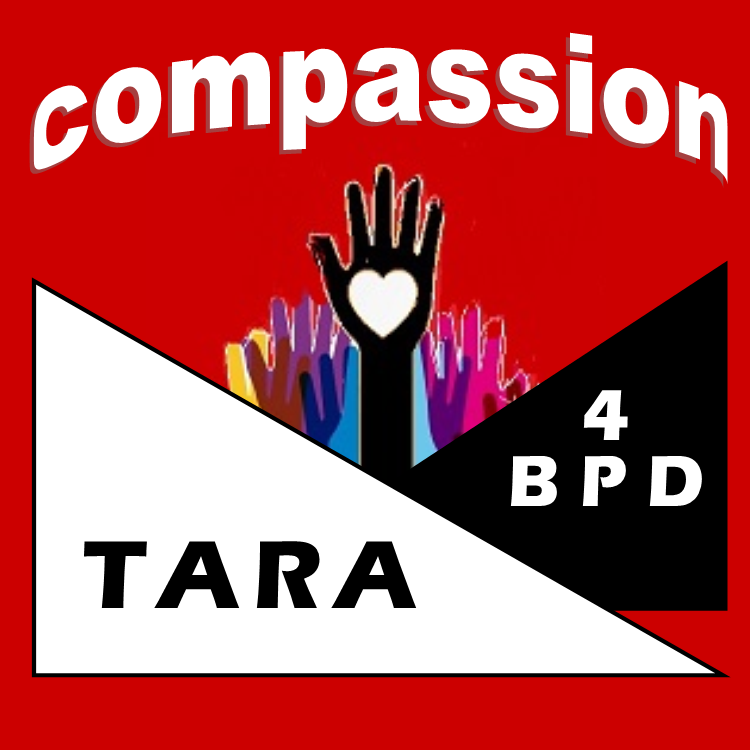Dear Friend:
Welcome to TARA4BPD, the Treatment and Research Advancements We would like to introduce you to TARA and show you how TARA can help you and your family.
TARA, established in 1994, is the first non-profit organization devoted to advocacy, research and education for those affected by Borderline Personality Disorder (BPD). Borderline Personality Disorder is a chronic mental illness characterized by high sensitivity, impulsivity, emotional vulnerability and dysregulations, frequent mood changes, serious problems with interpersonal relationships, distorted, rigid, black-white thinking, and self destructive behaviors (cutting and burning.) There is a high frequency of substance abuse, including misuse of pain medications and alcoholism amongst BPD sufferers as well as eating disorders, gambling, and sex addiction.
TARA has operated a Helpline for the past 20 years. The data collected from these calls tell us that, in general, BPD seems to begin before or at the start of adolescence. Before receiving the actual diagnosis of BPD, the person is usually diagnosed with approximately 5 of the following disorders: ADHD, Depression, Anxiety, Bipolar Disorder, Conduct Disorder, Obsessive Compulsive Disorder, Oppositional Defiant Disorder or PTSD. The person cycles through treatment for these various diagnoses and usually finds the therapy they receive to be ineffective, as it is not dealing with the actual problem, which is BPD. You would not likely recover from heart disease if you were being treated for cancer. The person with BPD is in constant emotional pain that the therapy does not alleviate. In an effort to relieve their emotional pain they often engage in substance or alcohol abuse, self-injurious behaviors such as cutting and burning, eating disorders, violence, may attempt suicide and, in 10% of the cases, succeed at suicide. BPD is highly stigmatized by mental health professionals who are reluctant to give the diagnosis. BPD makes up 6% of the general population yet is generally unknown by the general public. The person and their family feel isolated, misunderstood and hopeless.
Specific evidence based treatments have been developed for BPD. They have been shown to be effective in helping people with BPD live better lives. These include Dialectic Behavior Therapy (DBT), Transference Focused Therapy (TFP) and Mentalization (MBT). DBT teaches the person skills to cope with their emotional dysregulations, to focus on the moment by being mindful, distress tolerance skills and interpersonal effectiveness skills. MBT and TFP focus on helping the person understand their reactions to others as well as the intentions of others and how to manage interactions with other people, emphasizing those they are the closest to, those they are "attached to."
We disseminate accurate information on BPD to consumers, families and professionals. We recommend learning as much about BPD as you can from reliable, evidence based sources. Begin with Overcoming Borderline Personality Disorder, a Family Guide for Healing and Change, Oxford University Press, by TARA President and Founder, Valerie Porr, MA. We recommend you read any (or all) of the books on our book list located to the left of this column..
TARA offers educational programs for family members that teach coping skills to decrease frequency and intensity of stressful interactions and angry confrontations, how to motivate loved one's to engage in evidence based treatment for BPD and how you can reinforce that treatment. These are offered in 8-12 week family classes in New York, as well as weekend workshops . We will be developing 12-week on-line classes. TARA also conducts monthly telephone-seminars on specific topics and monthly TARA Forums where we answer family questions. Our referral service will direct you to qualified BPD experts in your area (1-888-4-taraapd or tara4bpd@gmail.com). Sadly, we are often unable to refer people to appropriate treatment, as it is unavailable in their community. If that is the case for you, the next best thing to do is to become as familiar as possible with the disorder and how it is best treated. Consider starting a TARA Book Club or support group in your area. TARA4BPD can help you seek out others with similar problems and help you to structure these meetings. You can also attend meetings such as AA or Recovery Inc.
BPD is a disability that can be managed and overcome by the individual and their loved one. We at TARA appeal to BPD sufferers and their loved one's not to give up hope, but to seek out the evidence based treatment available that can help.
We thank you for your interest in TARA and hope you will become a TARA member so that we can continue our vitally needed work. We look forward to the opportunity of helping you and your family.
Sincerely Yours,
Valerie Porr, MA
President, TARA4BPD

